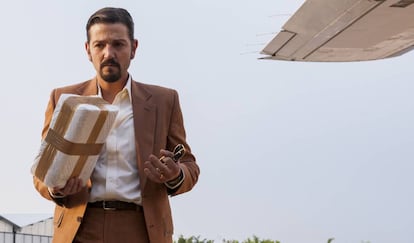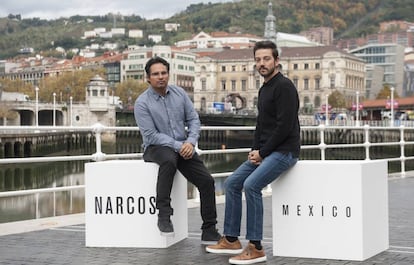Diego Luna: “Narcos doesn’t glorify drug dealers but they are interesting characters”
The Mexican actor responds to criticism for starring as the founder of the Guadalajara Cartel in the fourth season of the Netflix series, which was released on Friday


Mexican actor Diego Luna likes to speak his mind. When it was announced he would have the lead role in Narcos: Mexico, the fourth season of the Netflix series, and which was released by the streaming service on Friday, many people in Mexico criticized him for being hypocritical. To his critics, it seemed incongruous that he could play the role of a drug dealer while protesting in the street against the country’s Internal Security Act, a law that puts the military in control of public safety.
Leo muchas opiniones de una serie que no hemos ni terminado de filmar. ¿Les parece que discutamos cuando la vean?
— diego luna (@diegoluna_) December 21, 2017
“I’ve read a lot of opinions about a series we haven't finished filming yet. How about we talk about it when you see it?”
Perhaps it was the price of expressing his opinion, of using his fame to comment on the political situation in Mexico. But the criticism did little to stop him from speaking up. At an interview in Bilbao in Basque Country to promote the series, he passionately and carefully defends every one of his decisions.
The 38-year-old has been in the spotlight since he was 10. He has made for a name for himself both in Spanish-language films such as Y Tu Mamá También, and in Hollywood blockbusters such as Star Wars: Rogue One (his character has been given its own spinoff series on Disney+). Luna knows the industry and is not afraid to voice his opinions, even when a Netflix official says the interview with EL PAÍS has gone overtime. “A little longer, I buy this newspaper. Ask me two questions in one,” he says.
Question: Although you were a child at the time, what do you remember about the Narcos era in Meixco, and the beginning of the drug-trafficking networks?
Answer: The case of the Drug Enforcement Administration (DEA) agent “Kiki” Camarena [the undercover agent was abducted in 1985 and tortured and murdered in Mexico] changed people’s feelings. I remember it well. Violence that seemed contained and localized was unleashed and changed Mexico and its relationship with the United States forever. I remember it from the perspective of a child but it was interesting to research and rebuild the context. It made me remember a Mexico that doesn’t exist anymore, with the freedom that I had as a child and that my children don’t experience. Recreating 1985 made me nostalgic and made me realize how little I knew about what was happening.

Q. Your character, Miguel Ángel Félix Gallardo, founded the Guadalajara Cartel but continues to be an unknown. He is no Pablo Escobar (who continues to feature in the fourth season)
A. He is the opposite of Escobar. The guy understood the value of discretion. He was a businessman, not the common extravagant drug dealer. This guy knew what he was doing, he went one step ahead and achieved what nobody thought was possible: to sit down with everyone and create a system. One thing the series shows that I think is important is that even he worked for other people. They made us believe there were good guys and bad guys, cops and robbers and here is a system where all spheres of power took part.
Q. Even the political?
A. It’s key. Police officers, the military… and the power on the other side of the border. This could not be set up without coordination. I grew up in the long period that the PRI [Institutional Revolutionary Party] kept us sedated. When the PRI accepted it had lost the election, the system came down, but many said that at least they could negotiate.
My character is the bad guy but it is important to remember that there are criminals wearing suits, in positions of power
With this character [Miguel Ángel Félix Gallardo], I realize that they made us believe that the government was a victim. They said they were negotiating but they only sat down to plan and arm a business that belonged to them. The big business of power in Mexico was related to drugs.
Q. There is a very thin line between making people aware of these stories and turning their protagonists into icons. Could this be dangerous?
A. I’ll tell you why did it. I don’t think it glorifies them. It shows a very dark world that I don’t want to belong to. But this profile always arouses interest. Characters who are willing to cross a line that you and I never would. As long as their stories are not given a hero’s arc, you are doing a good job.
We humanize Félix’s journey because it is important that he not be one-dimensional, that he is not just the bad guy. He is moved by the same things as everyone: love, pain, anger, jealousy, friendship, freedom… He even questions the business. But I am against inviting the public to participate. That is horrifying.
Q. In response to criticism for accepting the role, you said we should not forget these stories.
A. We have to understand where the levels of violence we see and the tense relationship with the US comes from… And we have to look at our past. I’m not saying Narcos is the way but hopefully it awakens some curiosity.
But what’s most important is for people outside the country to listen, to ask themselves what has to happened so that cocaine can get to their parties and what’s behind this: exploitation, violence, pain, loss… and in Mexico we have to ask ourselves how a country as rich as ours could force so many people into taking this path.
Hopefully people ask themselves what has to happen so that cocaine can get to their parties
We have one of the richest men in the world, [telecommunications magnate] Carlos Slim and so many shortcomings that part of the population is willing to take part in this world to survive, or to cross the border and risk their lives. The inequality is shocking.
Q. Does Narcos use history to speak about current problems?
A. It speaks about abandoning the black-and-white rhetoric that is so prevalent today. In Brazil, there is [far-right President Jair] Bolsonaro and in the US, there is Trump, sending 5,000 soldiers to guard the border against a migrant caravan of families fleeing violence. Something that is a human problem, the US and Mexico treat as a security problem. We have to stop the rhetoric of you’re either with me or against me and value nuance.
My character is the bad guy but it is important to remember that there are also criminals in the streets wearing suits, in positions of power, seated in chambers, making decisions… We have been forced to see history one way and there are many angles that we ignore. We did not make a documentary, it is fiction but it encourages debate. Although I believe there are projects that confuse the discussion, this is not one of them. If it was, I wouldn’t have got involved. If they criticize it, they should see it and then we can discuss it.
English version by Melissa Kitson.
Tu suscripción se está usando en otro dispositivo
¿Quieres añadir otro usuario a tu suscripción?
Si continúas leyendo en este dispositivo, no se podrá leer en el otro.
FlechaTu suscripción se está usando en otro dispositivo y solo puedes acceder a EL PAÍS desde un dispositivo a la vez.
Si quieres compartir tu cuenta, cambia tu suscripción a la modalidad Premium, así podrás añadir otro usuario. Cada uno accederá con su propia cuenta de email, lo que os permitirá personalizar vuestra experiencia en EL PAÍS.
¿Tienes una suscripción de empresa? Accede aquí para contratar más cuentas.
En el caso de no saber quién está usando tu cuenta, te recomendamos cambiar tu contraseña aquí.
Si decides continuar compartiendo tu cuenta, este mensaje se mostrará en tu dispositivo y en el de la otra persona que está usando tu cuenta de forma indefinida, afectando a tu experiencia de lectura. Puedes consultar aquí los términos y condiciones de la suscripción digital.








































